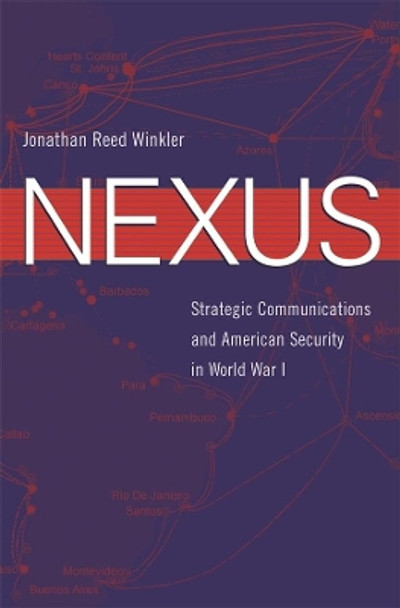Description
In an illuminating study that blends diplomatic, military, technology, and business history, Jonathan Reed Winkler shows how U.S. officials during World War I discovered the enormous value of global communications.
At the outbreak of war in 1914, British control of the cable network affected the Americans' ability to communicate internationally, and the development of radio worried the Navy about hemispheric security. The benefits of a U.S. network became evident during the war, especially in the gathering of intelligence. This led to the creation of a peacetime intelligence operation, later termed the "Black Chamber," that was the forerunner of the National Security Agency.
After the war, U.S. companies worked to expand network service around the world but faced industrial limitations. Focused on security concerns, the Wilson administration objected to any collaboration with British companies that might alleviate this problem. Indeed, they went so far as to create a radio monopoly and use warships to block the landing of a cable at Miami.
These efforts set important precedents for later developments in telephony, shortwave radio, satellites-even the internet. In this absorbing history, Winkler sheds light on the early stages of the global infrastructure that helped launch the United States as the predominant power of the century.
The fight for mastery of global telecommunications in the midst of the First World War is a subject of the deepest importance that had lain undiscovered until now. Jonathan Winkler has reconstructed the complex nexus of strategy, technology, and diplomacy with admirable clarity. It is a fundamental contribution that demonstrates the need for a whole new field of historical inquiry. -- Matthew Connelly, author of Fatal Misconception: The Struggle to Control World Population In a landmark book, Winkler shows how most of the issues of the information economy--and its handmaiden, information security--were thrust upon the United States by World War I, when the nation found that British domination of the cable infrastructure, combined with London's strategic grasp of its possibilities, reduced the U.S. to a humiliating dependence. How America tried to escape from the shackles of the British monopoly on communications makes a fascinating tale. -- Richard R. Fernandez, The Belmont Club (fallbackbelmont.blogspot.com) As children of the information age, we appreciate the vital role of communications in national security planning. Jonathan Winkler takes us back to an era when the principles of informational warfare were first being thrashed out--in foreign ministries, in military headquarters, under the sea, and in the atmosphere. A fascinating tale of technology, diplomacy, and intrigue. -- H. W. Brands, University of Texas, Austin Winkler tells a story that should figure into all future accounts of U.S. participation in World War I. -- Ernest R. May, Harvard University By examining the ways in which World War I sparked official recognition of the commercial and strategic importance of cable and radio, Winkler illuminates a vital, but neglected, chapter in the history of global communications. This is a thoroughly researched, well-written, and engaging study. -- Emily S. Rosenberg, University of California, Irvine
About the Author
Jonathan Reed Winkler is Associate Professor of History at Wright State University.
Reviews
The fight for mastery of global telecommunications in the midst of the First World War is a subject of the deepest importance that had lain undiscovered until now. Jonathan Winkler has reconstructed the complex nexus of strategy, technology, and diplomacy with admirable clarity. It is a fundamental contribution that demonstrates the need for a whole new field of historical inquiry. -- Matthew Connelly, author of Fatal Misconception: The Struggle to Control World Population
In a landmark book, Winkler shows how most of the issues of the information economy--and its handmaiden, information security--were thrust upon the United States by World War I, when the nation found that British domination of the cable infrastructure, combined with London's strategic grasp of its possibilities, reduced the U.S. to a humiliating dependence. How America tried to escape from the shackles of the British monopoly on communications makes a fascinating tale. -- Richard R. Fernandez, The Belmont Club (fallbackbelmont.blogspot.com)
As children of the information age, we appreciate the vital role of communications in national security planning. Jonathan Winkler takes us back to an era when the principles of informational warfare were first being thrashed out--in foreign ministries, in military headquarters, under the sea, and in the atmosphere. A fascinating tale of technology, diplomacy, and intrigue. -- H. W. Brands, University of Texas, Austin
Winkler tells a story that should figure into all future accounts of U.S. participation in World War I. -- Ernest R. May, Harvard University
By examining the ways in which World War I sparked official recognition of the commercial and strategic importance of cable and radio, Winkler illuminates a vital, but neglected, chapter in the history of global communications. This is a thoroughly researched, well-written, and engaging study. -- Emily S. Rosenberg, University of California, Irvine
Winkler's book provides a lesson in the evolutionary nature of technological change. Winkler explores the first global internet--the international telegraph cable system that began shrinking Planet Earth at the end of the 19th century. -- Austin Bay * austinbay.net *
This story involves not only the history of communication, but also diplomatic, military, technology, and business history. While investigating interrelated developments in these fields, Winkler recreates the global communication network in place at the outbreak of the war and shows how each side engaged in the first real information war. Finally, he analyzes US officials' reaction to this new warfare and the policies they adopted to redress this nation's shortcomings in the field of global communication. A well-researched, highly readable work that makes a valuable contribution to a number of historical areas. -- T. A. Aiello * Choice *
Thanks to Winkler's careful work in military and civilian records, the book recounts in detail how a small group of American officials, spurred into action by the war emergency, tried to increase their nation's control over global information networks...Winkler's outstanding original research and clear writing make Nexus a valuable contribution to the history of information warfare, a subject that will almost certainly attract greater interest in the years to come. -- Mark R. Wilson * Business History Review *
This is a well-researched and important study assessing the role of global communication technologies and their control in wartime. It provides a cogent analysis of how the need to develop our own cable and radio links drove government policy. And it adds to the slowly growing number of studies that examine the increasingly central role of rapid and secure communication in both diplomatic and military policy in the 160 years since the development of the electric telegraph. -- Christopher H. Sterling * Journal of American History *
Awards
Winner of Paul Birdsall Prize 2010. Nominated for Douglas Dillon Award 2008 and Vincent P. DeSantis Prize 2009 and OAH Frederick Jackson Turner Award 2009 and Ellis W. Hawley Prize 2009 and William E. Colby Award 2009 and Stuart L. Bernath Book Prize 2009 and Robert Jervis and Paul Schroeder Best Book Award 2009 and Edgar S. Furniss Book Award 2008 and Woodrow Wilson Foundation Award 2009 and Sidney Edelstein Prize 2009 and Sally Hacker Prize 2009 and George Louis Beer Prize 2009 and Rachel Carson Prize & Ludwik Fleck Prize 2009 and William E. Colby Award 2010 and Sidney Edelstein Prize 2010 and Sidney Edelstein Prize 2011 and Ludwik Fleck Prize 2011.
Book Information
ISBN 9780674028395
Author Jonathan Reed Winkler
Format Hardback
Page Count 358
Imprint Harvard University Press
Publisher Harvard University Press






